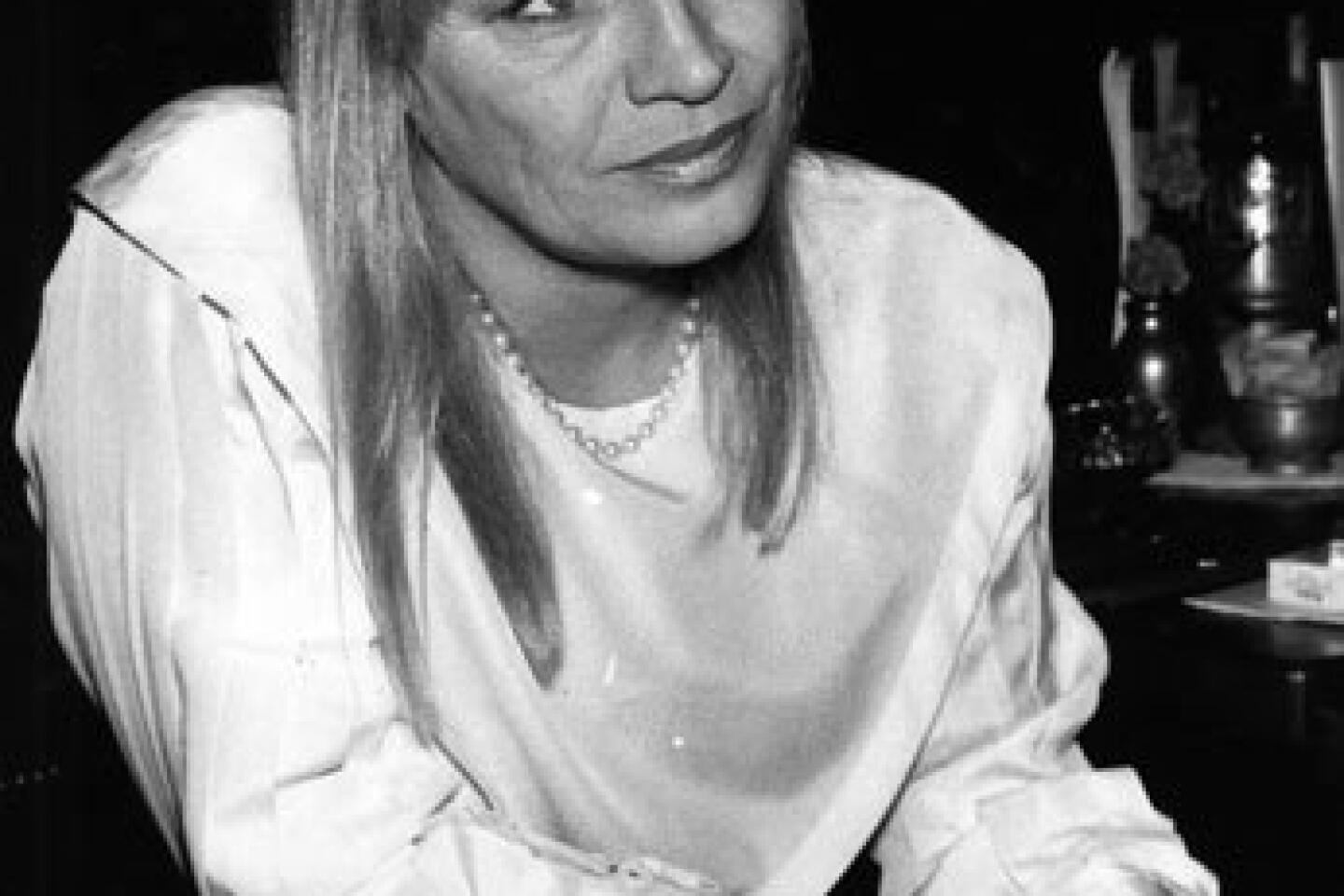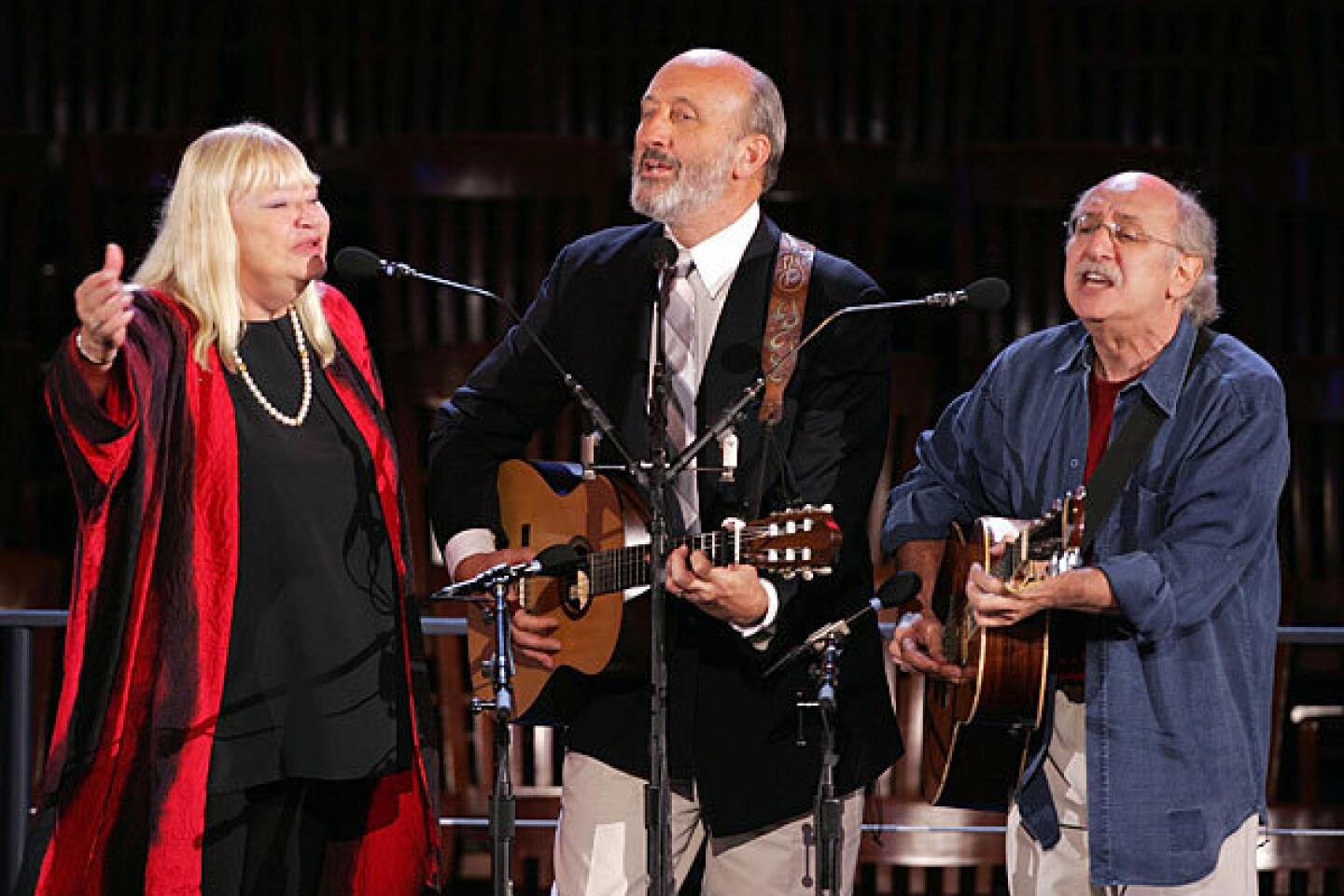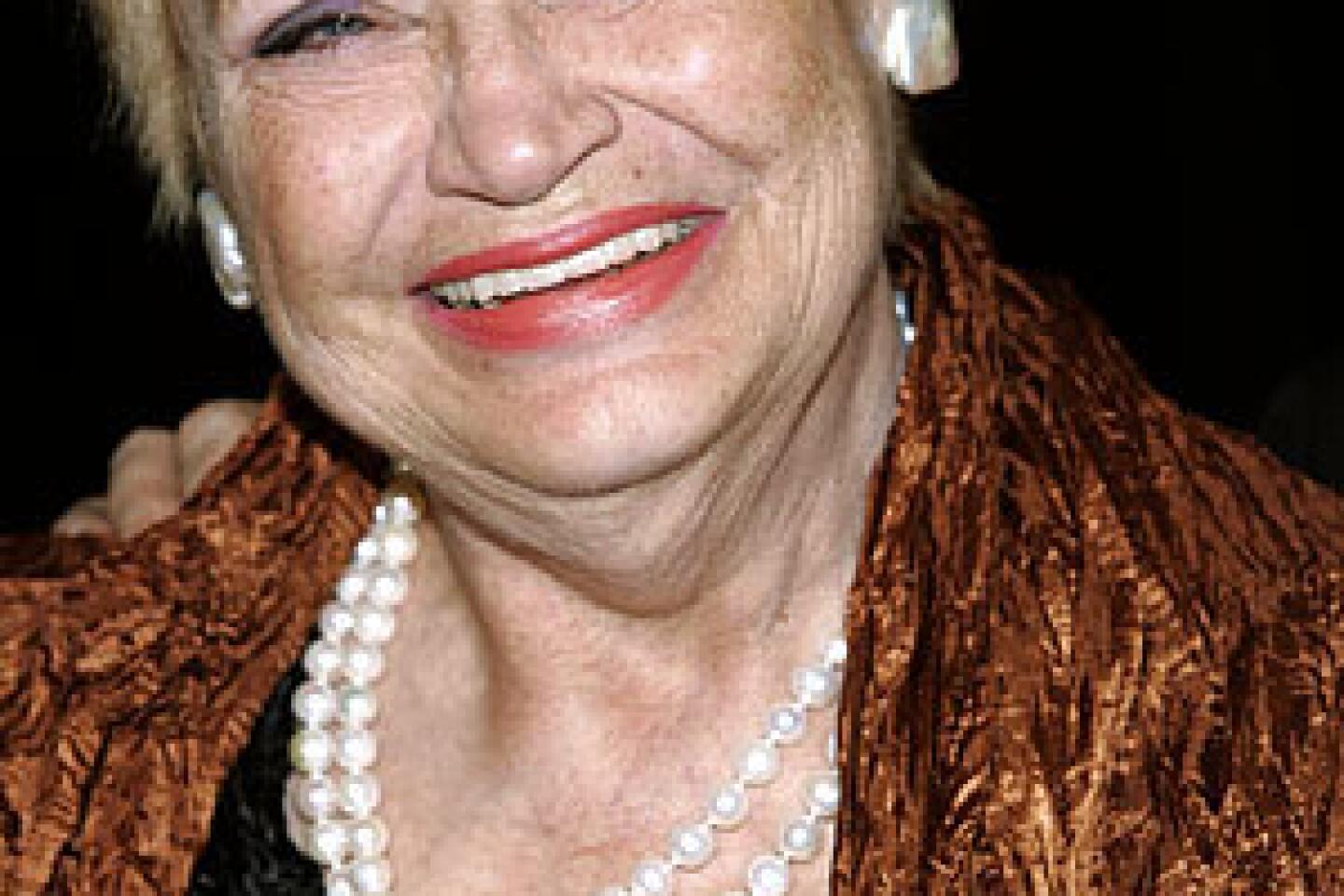Mary Travers dies at 72; folk singer performed with the trio Peter, Paul and Mary
Mary Travers, the clarion-voiced female third of the quintessential folk trio Peter, Paul and Mary whose harmony-laden recordings of politically minded songs by Bob Dylan and Pete Seeger ushered them to the top of the sales charts in the 1960s, died Wednesday after battling leukemia for several years. She was 72.
Travers, who had lived most of her life in a 250-year-old restored Connecticut farmhouse, died at Danbury Hospital, where her mother had been head of public relations for many years.
Travers had been diagnosed with leukemia in 2004, but had undergone a successful bone marrow transplant procedure in 2006 that eradicated the blood disease. She died from side effects of the chemotherapy, her family said.
“In her final months, Mary handled her declining health in the bravest, most generous way imaginable,” her longtime musical partner Peter Yarrow wrote in a note posted Wednesday on her website, www.marytravers.com. “She never complained. She avoided expressing her emotional and physical distress, trying not to burden those of us who loved her, especially her wonderfully caring and attentive husband, Ethan. Mary hid whatever pain or fear she might have felt from everyone, clearly so as not to be a burden.
“Her love for me and Noel Paul [Stookey] and for Ethan, poured out with great dignity and without restraint. It was, as Mary always was, honest and completely authentic,” Yarrow wrote. “That’s the way she sang, too; honestly and with complete authenticity.”
Wrote Stookey on the same website: “I am deadened and heartsick beyond words to consider a life without Mary Travers and honored beyond my wildest dreams to have shared her spirit and her career.”
Peter, Paul and Mary picked up the folk music torch that the Kingston Trio had ignited in the late 1950s with a string of best-selling albums and brought a more contemporary and socially conscious edge, making Top 10 pop hits out of “If I Had a Hammer [The Hammer Song],” written the previous decade by Seeger and Lee Hays of the Weavers, and Dylan’s “Blowin’ in the Wind.” They also gave early boosts to the careers of Gordon Lightfoot and John Denver by recording their songs.
Decades after the trio helped bring Dylan’s music to the masses, Travers said “Blowin’ In the Wind” was the song that still resonated the strongest for her. “Usually the morning paper has one of those questions,” she said in a 2006 interview, noting a story in that day’s newspaper about nuclear proliferation. “So how many years must the cannonballs fly before they’re forever banned?”
Even though Peter, Paul and Mary took socially minded folk music to a commercial pinnacle that has never been repeated, earning the threesome numerous gold and platinum records and five Grammy Awards, Yarrow told the Chicago Sun-Times in 1999, “I think we were a link, and I’m proud of that. But I don’t want to overstate our role.”
At that time, Travers added: “Peter, Paul & Mary were at the top of the charts in pop music in the ‘60s when folk music was pop music. That was a blip on the screen. Nobody who sang folk songs then or now is really consumed with the need to be part of pop music.”
Mary Ellin Travers was born Nov. 7, 1936, in Louisville, Ky., and moved when she was young with her family to New York. There she often accompanied her mother, Virginia Coigney, to folk music performances and other cultural events.
“My mother was a marvelous woman: bright, beautiful, dry wit. . . . She used to say to me, ‘Be careful of compromise, Mary. There’s a very thin line between compromise and accomplice.’ So that was Mom,” she told the New York Times in 1999. “I think I grew up at a time with mentors. I think it’s very hard for young people today because there isn’t really a whole lot of good mentor material out there. I had Pete Seeger, I had my mother and my father.”
She was singing in various folk groups when she was in her teens and was a member of the Song Swappers, which recorded two albums with Seeger, and was a part of the folk music community that was thriving in and around Greenwich Village.
She met Stookey, an electric guitarist who played rock ‘n’ roll in the 1950s, after he moved from Michigan to New York, where he was trying his hand at stand-up comedy. The two began playing as Stookey and Travers when folk impresario Albert Grossman introduced them to Yarrow, a native New Yorker, who had studied psychology at Cornell University.
They rehearsed as a trio for several months in Travers’ apartment, then made their debut at the Bitter End coffeehouse. Within a year, they had been signed by Warner Bros. Records and their debut album, “Peter, Paul & Mary,” which spent seven weeks at No. 1, gave them their first Top 10 hit with “If I Had a Hammer,” a song that captured the spirit of the growing civil rights and antiwar movements.
Travers’ voice soared above those of Yarrow and Stookey, embodying the spirit of freedom expressed in the explanatory refrain: “It’s the hammer of justice/It’s the bell of freedom/It’s a song about the love between/My brothers and my sisters/All over this land.”
They also had a major hit with the children’s song “Puff (the Magic Dragon),” which at one time was accused of containing a thinly veiled message about marijuana. “It was just a song about growing up. It was very innocent,” Travers said in a 1997 interview. “But that story was very damaging.”
With her straight, long blond hair and bangs clipped razor straight across her eyebrows, she was credited with bringing the ‘50s beehive hairstyle to an end, and, along with Joan Baez, created an archetype of the female folk singer that survives today.
Peter, Paul and Mary’s commercial punch faded as the ‘60s rolled on, and they disbanded in 1970 to pursue solo projects, then reunited in 1978 and continued touring regularly until Travers became too ill recently. They often performed at political rallies and protest events.
After her original leukemia diagnosis, when she was given a 40% chance of survival, but then bounced back after the bone marrow transplant, she said, “You have to have a sense of humor even in the midst of what can be very frightening . . . and you have to live in the now because if you get trapped into ‘what if’ or ‘I shoulda,’ you’re not living in the moment, you’re not living.”
In addition to her husband, Travers is survived by two daughters, Alicia and Erika; her sister, Ann Gordon; and two granddaughters.
More to Read
Sign up for Essential California
The most important California stories and recommendations in your inbox every morning.
You may occasionally receive promotional content from the Los Angeles Times.













